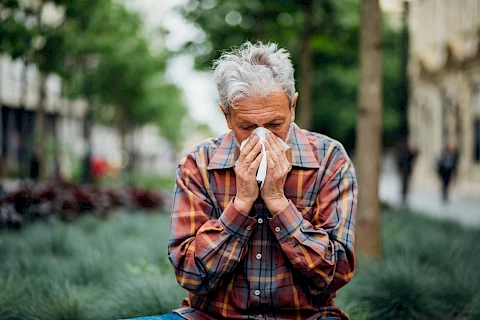
Allergies can significantly affect the quality of life of seniors in our care. Caregivers must have valuable information on common allergens, their symptoms, and robust strategies to counter them effectively in senior care settings. By providing insight into regular cleaning routines, utilization of air purifiers, and the importance of personalized management plans, we hope to improve the lives of seniors battling allergies.
Allergies and Their Impact on Seniors
Essentially, allergies are the immune system's response to substances known as allergens. When seniors are exposed to these allergens, they experience an allergic reaction. Some common allergens include dust mites, pollen, mold, pet dander, and certain food types.
The symptoms of allergies can vary depending on the type of allergen and the senior's health state. They can range from mild symptoms like sneezing, itchiness, and a runny nose to more severe symptoms like difficulty breathing. These allergic reactions can significantly impact a senior's quality of life, leading to discomfort, disturbances in sleeping patterns, and for some, exacerbation of existing respiratory conditions.
Strategies for Reducing Allergen Exposure in Senior Care
Caregivers need to learn to recognize the symptoms of allergies in seniors. Early detection can lead to early intervention, preventing complications. Keep a few strategies in mind to reduce allergen exposure and keep seniors healthy. If any symptoms are noticed, caregivers should seek advice from a healthcare professional.
Reduce Their Exposure as Much as Possible
You need to do everything possible to reduce seniors' exposure to allergens. Regular and thorough cleaning can significantly reduce the presence of common allergens. This includes dusting surfaces, vacuuming carpets and soft furnishings, and washing bedding frequently.
A regular cleaning routine can greatly help manage allergen exposure. It's important to establish this routine as part of the senior's care plan and be consistent in its implementation.
Set Up an Air Purifier
Air purifiers can also be extremely beneficial in reducing allergen levels. They filter the air to remove numerous allergens, ensuring cleaner, healthier air for seniors. However, not all air purifiers are the same, so choose one that can effectively remove the specific allergens in your senior's environment.
Air purifiers can be practical tools, but they need to be used correctly. Caregivers need to keep these devices clean and replace their filters as the manufacturer recommends.
Obtain a Doctor-Approved Allergy Plan
Healthcare professionals play a crucial role in allergy management. They can help develop a personalized management plan based on the senior's health condition and specific allergens. It's essential to maintain open communication with them, informing them of any changes in symptoms or reactions to allergens. They can guide you in mitigating allergen exposure and managing allergic reactions when they occur.
Get Assistance With Allergy Management From Senior Helpers Denver South
Allergy management is crucial to maintaining the quality of life for seniors. We can lessen the burden of allergies through awareness, regular cleaning, the correct use of air purifiers, and working closely with healthcare professionals.
If you live in Westminster, Northglenn, Lafayette, Commerce City, or Aurora, Senior Helpers Denver South is here to help. Our team can provide the utmost professional care in managing seniors' allergies. Don't hesitate to contact us for assistance in making your loved one's golden years more comfortable and enjoyable.